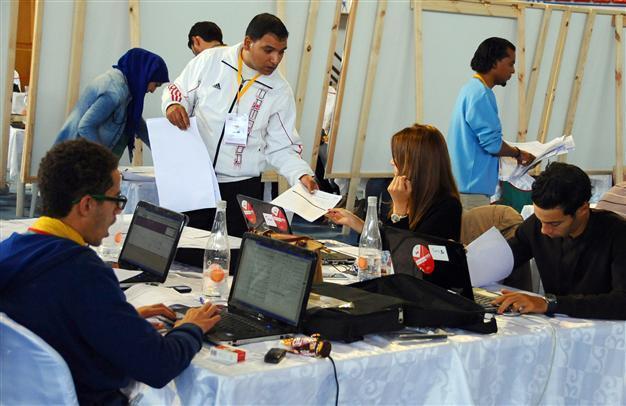Anti-Islamist leads Tunisia presidential race
TUNIS - Agence France-Presse

Election officials count votes at a polling station in Tunis, Tunisia, Monday, Nov. 24, 2014. AP Photo
The head of Tunisia's anti-Islamist Nidaa Tounes party, Beji Caid Essebsi, was on Nov. 25 leading the country's first presidential election since a 2011 revolution that sparked the Arab Spring uprisings.But with no outright winner from Sunday's poll, in which Essebsi took a lead of six percentage points over incumbent Moncef Marzouki, a runoff will be held in December.
The 87-year-old Essebsi secured 39.46 percent and Marzouki 33.43 percent of votes cast, according to results from an election hailed by European Union observers on Tuesday as "pluralist and transparent".
Leftwing figurehead Hamma Hammami came third with nearly eight percent, followed by London-based Islamist entrepreneur Hechmi Hamdi as well as wealthy businessman and football club president Slim Riahi who took more than five percent each.
The exact date of the second round of voting will depend on any appeals, the head of the ISIE elections body Chafik Sarsar told reporters.
Sunday's election was the first time Tunisians had voted freely for their head of state since independence from France in 1956. Turnout was 62.9 percent.
Before the 2011 revolt the North African nation had known just two presidents -- "father of independence" Habib Bourguiba and strongman Zine El Abidine Ben Ali, who was forced to flee by the Arab Spring unrest.
Marzouki was elected president at the end of 2011 by the National Constituent Assembly under a coalition deal with the then-ruling Islamist Ennahda party, which came second in a parliamentary election last month behind Nidaa Tounes.
Annemie Neyts-Uytterbroeck, who headed the EU observer mission in Sunday's election, praised the vote and described any irregularities as "minor".
"The exercise of freedom of expression and assembly was guaranteed," she said.
Runoff campaigning began even before the first round result became official.
Wasting no time in relaunching the battle, Essebsi labelled Marzouki the candidate of "jihadist Salafists", to which his rival countered by calling for "a debate on policies... not (a campaign of) insults".
The election is a milestone for Tunisia, where the ouster of long-time strongman Ben Ali set off a chain of revolts that saw several Arab dictators toppled by citizens demanding democratic reform.
US Secretary of State John Kerry hailed Sunday's vote as an "historic moment", while his French counterpart, Laurent Fabius, called for Tunisia's transition towards building new institutions to remain "inclusive and democratic".
Tunisian leaders pride themselves on the fact the country has been spared the bloodshed that has ravaged other Arab Spring states such as Libya and Yemen.
But it still faces significant challenges, including a growing jihadist movement, a weak economy and social unrest.
Despite fears of disruption by Islamist militants, polling on Sunday was peaceful.
The runoff is set to be polarising, however, with Marzouki's camp portraying him as the last line of defence against a return to the autocratic ways of the old regime, and Essebsi deriding him as an Islamist pawn.
Marzouki in a speech urged "all democratic forces" to back him against Essebsi, who served under both Ben Ali and Bourguiba.
"I am now calling on all democratic forces... alongside whom I have campaigned for the past 30 years for a real democracy, for a break with the past, for a genuine civil society and for a separation of powers," he said.
Marzouki argues that only he can preserve the gains of the uprising, while his critics say he hijacked the spirit of the revolution by allying himself with moderate Islamists Ennahda in 2011.
Ennahda rule was marred by a surge of radical Islamism and the assassination of two leftist politicians by jihadist suspects.
If Essebsi wins he will still have to form a coalition government, even with Ennahda, because Nidaa Tounes fell short of an absolute majority in October.
















